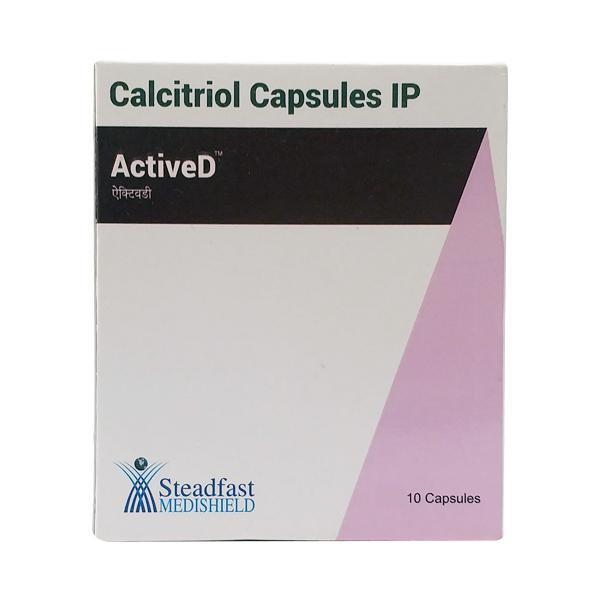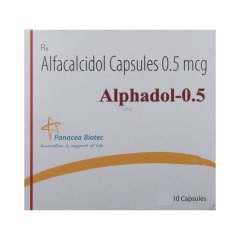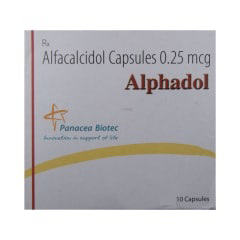Active D Capsule
$13.00 $10.00
Active D Capsule 10’S

Description
Active D Capsule belongs to a group of medicines called ‘vitamin D metabolites’ primarily used to treat low blood calcium levels. Capsule effectively treats various conditions caused by low calcium levels in the body, such as osteoporosis (weak and brittle bones), osteomalacia/rickets (weak bones), hypoparathyroidism (low levels of parathyroid hormone), and latent tetany (a muscle disease with low blood calcium levels).
Capsule can also be given to pregnant, nursing, and postmenopausal women to ensure that they are getting enough calcium. Additionally, it is used to treat hyperparathyroidism (overactive parathyroid glands) and metabolic bone disease in people with chronic kidney disease, surgery, or other conditions.
It contains Calcitriol (Vitamin D3); it is used to prevent or treat a calcium deficiency. It is an essential nutrient to maintain bone formation and maintenance. Calcitriol is a synthetic version of Vitamin D3 and treats calcium deficiency with hypoparathyroidism (the parathyroid gland’s decreased activity) and metabolic bone diseases in people with chronic kidney failure. It raises Vitamin D levels and thereby increases calcium levels in the blood. This helps in improving the absorption rate of calcium from the intestine.
Take Capsule as prescribed by your doctor. You are advised to take Capsule for as long as your doctor has prescribed it for you, depending on your medical condition. In some cases, it can cause side effects like constipation or stomach upset, nausea, vomiting, loss of appetite, mood changes, weakness, tiredness, fast or pounding heartbeat, bone/muscle pain, and headache. Most of these side effects of Capsule do not require medical attention and gradually resolve over time. However, if these side effects persist longer, please consult your doctor.
If you are known to be allergic to Active D Capsule or its inactive components, please inform your doctor. Pregnant or breastfeeding women should consult their doctor before taking Capsule. Higher doses of Vitamin D than the recommended daily dose should be used in pregnant women only when advised by the doctor.
Active D Capsule may pass into the breast milk, hence breastfeeding mothers need to seek medical advice before starting Capsule. Do not take Capsule if you have hypercalcemia (high calcium levels), hypervitaminosis D (high vitamin D levels), and malabsorption syndrome (difficulty absorbing nutrition from food).
Inform your doctor if you have any heart/kidney/liver/blood vessel diseases, kidney stones, sarcoidosis (growth of inflammatory cells in different parts of the body), Crohn’s disease (inflammatory bowel disease), Whipple’s disease (bacterial infection affecting joints and digestive system), achlorhydria (little or no stomach acid), low levels of bile, and phosphate imbalance.
Read More:
Uses
- Osteoporosis (weak and brittle bones)
- Osteomalacia/rickets (weak bones)
- Hypoparathyroidism (low levels of parathyroid hormone)
- Latent tetany (a muscle disease with low blood calcium levels)
Medicinal Benefits
Active D Capsule effectively treats various conditions caused by low calcium levels in the body, such as osteoporosis (weak and brittle bones), osteomalacia/rickets (weak bones), hypoparathyroidism (low levels of parathyroid hormone), and latent tetany (a muscle disease with low blood calcium levels).
Active D Capsule can also be given to pregnant, nursing, and postmenopausal women to ensure that they are getting enough calcium. Additionally, it is used to treat hyperparathyroidism (overactive parathyroid glands) and metabolic bone disease in people with chronic kidney disease, surgery, or other conditions.
Directions for Use
Storage
Side Effects
- Hypercalcaemia (high calcium levels in the blood)
- Loss of appetite
- Weight loss
- Feeling sick
- Being sick
- Headache and feeling sluggish
- Drowsy or weak
- Stomach pain or discomfort
- Urinary tract infection
- Rash
In-Depth Precautions and Warning
Drug Warnings
Before taking Active D Capsule, inform your doctor if you are undergoing hemodialysis due to kidney problems and have a stent in the heart. Capsule may alter calcium levels, so it is recommended to regularly monitor calcium levels in the blood and urine.
Inform your doctor immediately if you notice fever, increased thirst and urination, dehydration, bedwetting, constipation, and stomach pain, as they may sign very high levels of calcium in your blood. Pregnant or breastfeeding women should consult their doctor before taking Capsule. Higher doses of Vitamin D than the recommended daily dose should be used in pregnant women only when advised by the doctor.
Active D Capsule may pass into the breast milk, hence breastfeeding mothers need to seek medical advice before starting Capsule. Do not take Capsule if you have hypercalcemia (high calcium levels), hypervitaminosis D (high vitamin D levels), and malabsorption syndrome (difficulty absorbing nutrition from food).
Drug Interactions
Drug-Drug interactions: Active D Capsule may interact with other medicines containing vitamin D, Steroid medicines (hydrocortisone, prednisolone, dexamethasone), a medicine used to treat high levels of cholesterol in your blood (cholestyramine), medications containing magnesium, such as antacids (used to treat indigestion), medicines used to treat heart disease (digoxin or digitoxin), and diuretic medicines (bendroflumethiazide, chlortalidone, indapamide)
Drug-Food interactions: Do not take foods enriched with vitamin D and avoid a high intake of dairy products such as milk, ghee, and cheese.
Drug-Disease interactions: It is not recommended for use in patients with bleeding disorders, hypercalcemia (high levels of calcium in the blood), metastatic calcification (extra deposits of calcium in the body), kidney problems, high blood pressure, cancer, optic nerve damage, and high levels of vitamin D.
Safety Advice
-
ALCOHOL
Drinking alcohol can affect calcium absorption, hence it is advised to limit the alcohol intake while using Active D Capsule.
-
PREGNANCY
During pregnancy, use higher doses of Active D Capsule than the daily dietary allowance only when advised by the doctor. Calcitriol in higher doses may harm the fetus. Your doctor will weigh the potential risks and benefits before prescribing Capsule.
-
BREASTFEEDING
Consult your doctor before taking Capsule if you are breastfeeding. Active D Capsule can pass into the breast milk. If it is used during breastfeeding, please monitor the mother and the infant’s serum calcium levels.
-
DRIVING
Active D Capsule may not affect your ability to drive.
-
LIVER
Let your doctor know if you have any history of liver diseases before taking Active D Capsule. Hepatic impairment/liver disease can alter the metabolic and therapeutic activity of certain Vitamin D forms.
-
KIDNEY
It is advised to seek doctor advice before starting Active D Capsule if you have kidney diseases like kidney stones or undergoing dialysis. Calcitriol in Capsule increases inorganic phosphate levels in serum, hence caution should be taken in patients undergoing dialysis to maintain adequate phosphorus levels and avoid ectopic calcification (calcium deposition).
Habit Forming
Diet & Lifestyle Advise
- Include dairy products like milk, yogurt, cheese, or milk-based custard in your diet.
- Eat daily a serving of broccoli, cabbage, bok choy, spinach, and other green leafy vegetables.
- Snack on calcium-rich nuts like Brazil nuts or almonds.
- Sprinkle sesame seeds over your food, vegetables, and salads. Sesame seeds are high in calcium.
- Avoid or reduce the intake of caffeine, soft drinks, and alcohol that inhibit calcium absorption.
- Replace the meat with tofu or tempeh for extra calcium in your food.
Special Advise
- It is not indicated in patients with or with a history of kidney stones, as it may increase the chance of kidney stone formation. Consult your doctor for further advice.
- Your doctor may advise regular monitoring of calcium levels.
Storage
Keep out of reach of children
Do not use after the expiry date
Store at room temperature (15-25°C)
Be the first to review “Active D Capsule” Cancel reply
Related products
Osteoporosis
Osteoporosis
Osteoporosis
Osteoporosis
Osteoporosis
Osteoporosis
Osteoporosis
Osteoporosis


















Reviews
There are no reviews yet.